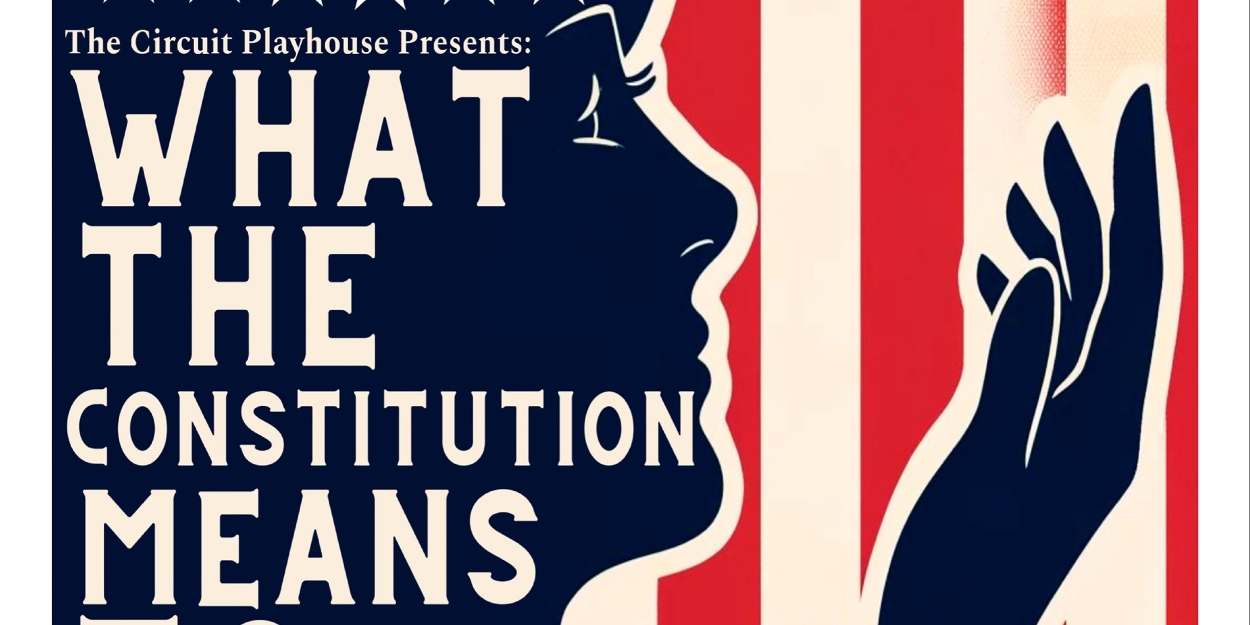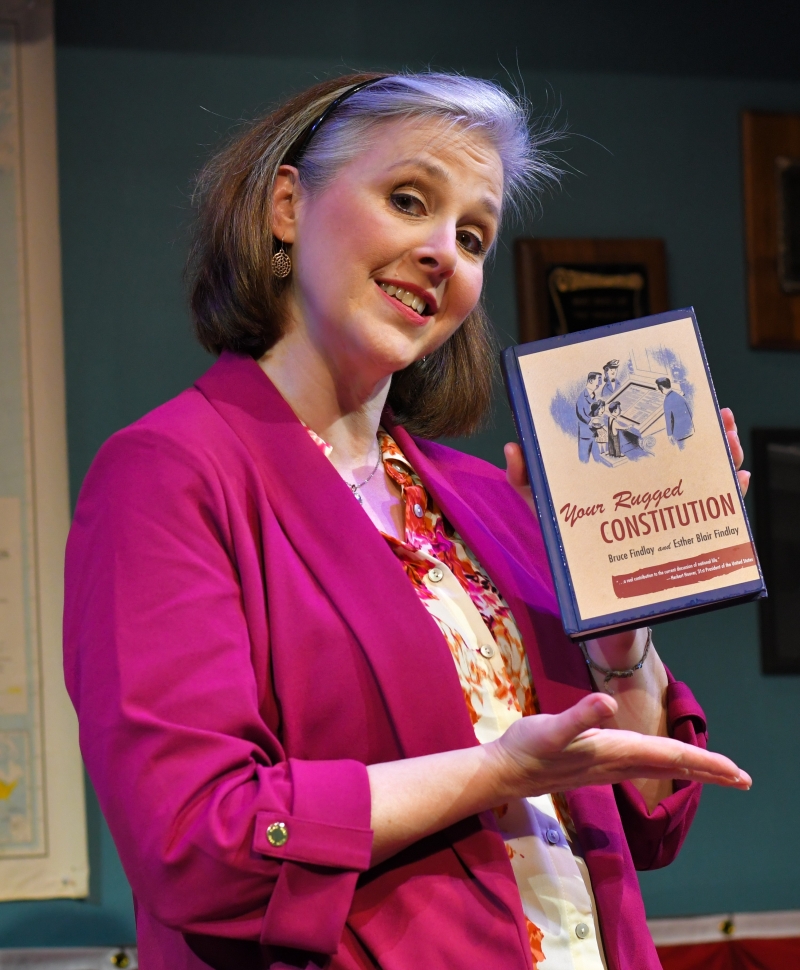Review: WHAT THE CONSTITUTION MEANS TO ME at Circuit Playhouse
Running now through October 6th.

Since 2015, Donald Trump has been on the American political stage (and thus in our collective consciousness) in unprecedented ways. He continues to shock and surprise the world so much that he's no longer shocking or surprising. There’s plenty of fodder for debate as to what has been his most abhorrent statement or action, but perhaps at the top of the list occurred in 2022 when, in another tantrum arguing that the 2020 election was “stolen,” Trump posted on his Truth Social platform that essentially the United States Constitution should be abolished. Taking full effect in 1789, Trump argued that the precedent, guidelines, and rules for how the American government should operate for the past 235 years should be eliminated. Never has a former President argued for such a thing. If government were a religion (and for far too many it is), it would be akin to the Pope arguing to do away with the bible. Crazy! Ludicrous! But is it really? Do the first three words of the Constitution (“We the people”) truly represent ALL the people? Or did “We the people” just include old white men? Did “the people” also mean women, people of color, people with disabilities, immigrants, LGBTQ+, etc.? Did it include them when the document was written? Did it even include them for the first one hundred years of its existence? The first two hundred years? The last twenty? In Circuit Playhouse’s latest production, WHAT THE CONSTITUTION MEANS TO ME, author Hedi Schreck dares to challenge the document both philosophically and literally. The “idea” of the U.S. Constitution sounds good until you realize you may be one of the many in this great nation it has conveniently overlooked. Under the direction of Dave Landis and starring two of Memphis’ finest actors, this 90-minute production places America’s most revered document on trial in ways that will jostle you to your core and cause a reflection in new and disconcerting ways.

Written in 2017 and premiering on Broadway in 2019 with author Schreck playing the lead, the play is a semi-autobiographical story of when 15-year-old Schreck used to compete in speech contests about the Constitution to win prize money for college. In it, Schreck transports herself back and forth in time delivering those speeches and then returning to present day to comment on them. It’s an exercise in naivete’ mixed with painfully earned wisdom as Schreck must grapple with the glaring discrepancies between what the Constitution says and how it has affected her life as an American woman. Oftentimes, these speeches were delivered to Legionnaires (retired military men) and despite the overt irony of a young girl “arguing” to a room plastered with pictures of old white men of how all Americans are created equal, Schreck is quite earnest. It’s only when she starts to age does Schreck realize how the Constitution didn’t/doesn’t in fact offer the same rights to her or protections for generations of the women in her family. Instead, the reality quickly sets in that cisgendered, able-bodied, heterosexual white male citizens created a government by them and only for them.

Kim Justis Eikner plays Heidi Schreck and offers up an immersive exploration of key components of the Constitution and argues convincingly for its virtues and its flaws. She points out that although our Constitution is currently the oldest in the world, it’s a “negative rights” document that doesn’t give people rights, but prevents them from being taken away (guns, freedom of speech, religion, etc.). But what if you’re a person who never had those rights to begin with? Eikner is a naturally gifted performer who seamlessly switches into becoming a 15-year-old debater; then a wounded adult who’s endured the struggles of NOT being a white man in America; followed by being an actor herself. With each perspective, the Constitution takes on a whole new meaning. Through her eyes (as young Heidi, older Heidi and then Kim Justis Eikner, the actor) she reveals the blind spots most of us have when it comes to our rights and privileges which are dependent on our own unique circumstances. Making a case for and against the Constitution with humor, gravitas and conviction is a lot harder than it looks, but Eikner is an expert storyteller and pulls it off with aplomb.

Representing the “white male” in America, Michael Gravois delights as the American Legion judge who coordinates the high school debates and speeches. He stands in for a large group of the marginally educated who seem to cherry pick the parts of the Constitution which “resonate” with them while also condemning anyone who might disagree. Gravois’ Legionnaire is not quite a caricature of a conservative military man, but he is wholly convincing as a white man who proudly follows orders as they are written without question. It’s not until the end of the show that Mr. Gravois, the actor reveals his true self (like Eikner does) and shares just how the same Constitution that pushed members of the LGBTQ+ community into the closet (like himself) also could be later interpreted as a dictum to be freed from it. This document can be the shackles or the keys. Dichotomies abound.

Finally, in the truest example of what a democracy should look like, Ann Marie Rose Gaines enters as a high school debater to debate Kim Justis Eikner (the actor) on the topic of whether America should keep the Constitution or abolish it. Gaines is articulate, polished, and convincing in her stance to keep it intact, while Justis offers compelling reasons to discard it. The audience is encouraged to “vote” throughout the debate with their cheers or boos and one audience member is selected to be the final judge as to who wins. Again, it’s a wonderful lesson in what a democracy is supposed to look and sound like.
WHAT THE CONSTITUTION MEANS TO ME was nominated for a Tony Award for Best Play and was a finalist for the Pulitzer Prize for Drama. It begins and ends as an intellectual experience for the viewer, but with emotionally charged anecdotes in between. The audience is handed a pocket copy of the Constitution for reference upon entering the theatre and this production is timed perfectly just before the 2024 presidential election. The overall experience is a reminder that we need to not just be a member of the electorate, but also an educated member. We need to question things that some say should never be questioned. We need to ask ourselves does the Constitution work for me AND for my fellow American. In the end, this impressive production does provide an answer to the radical question of what we should do about our founding document. Should America keep or abolish the Constitution? Yes, it should.
Comments
Videos

